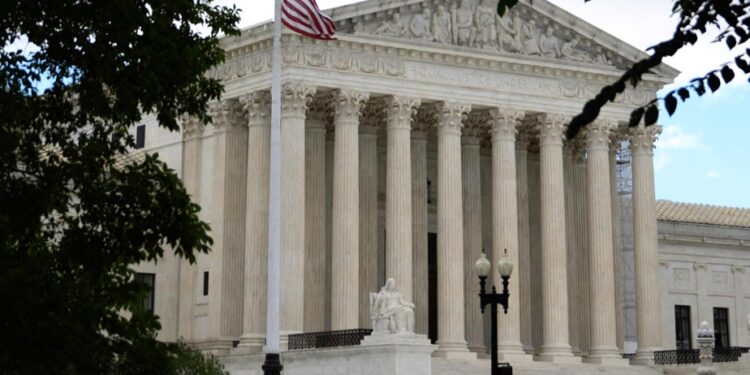(Washington) A divided Supreme Court authorized Donald Trump administration on Monday to relaunch rapid referrals of migrants to countries other than their country of origin, raising for the moment an order requiring that they have the possibility of contesting the expulsions.
The majority of the Supreme Court did not detail its reasons in this brief order, as is usual in these emergency cases. The three progressive judges expressed their disagreement with the prescription.
This decision follows the boarding of eight people by plane for South Sudan in May. The American district judge Brian E. Murphy, in Boston, estimated that this violated his order which gave the persons concerned the possibility of arguing that they were likely to be tortured if they were sent elsewhere than their country of origin.
Migrants from Burma, Vietnam and Cuba, in particular, had been convicted of serious crimes in the United States, and the immigration authorities said they were unable to return them quickly to their country of origin.
After the intervention of Judge Murphy, the authorities landed the plane on an American naval base in Djibouti. Migrants were hosted there in a fitted maritime container. The agents who monitored them had to face difficult conditions, while the lawyers specialized in immigration awaited news from their customers.
This case comes in a context of a vast repression of immigration led by the administration of Republican President Donald Trump, who is committed to expeling millions of people living in an irregular situation in the United States.
As some countries do not accept American expulsions, the administration has concluded agreements with other countries, including Panama and Costa Rica, to host them. South Sudan, on the other hand, suffered repeated waves of violence since its independence in 2011.
The decree of judge Murphy does not prohibit expulsions to third countries. However, it stipulates that migrants must have a real possibility of arguing that they are seriously likely to be tortured if they are returned to another country.
In a scathing dissent of 19 pages, judge Sonia Sotomayor wrote that the court’s decision exhibited “thousands of people at the risk of torture or death”.
“The government has clearly indicated, in words and acts, that it felt free to expel anyone, wherever it is, without notice or possibility of being heard,” she wrote in her dissident opinion, to which Judges Elena Kagan and Ketanji Brown Jackson joined.
The judges were confronted with a similar problem in Donald Trump’s attempt to send Venezuelans accused of belonging to gangs in a sadly famous prison in Salvador, with few possibilities to challenge these expulsions to the courts.
In this case, the Court stressed that migrants had to benefit from a “reasonable time” to file a legal dispute before being expelled, and the majority prevented the administration from resuming the expulsions while the lower courts determined precisely the delay which would be granted to them.
The main conservative Supreme Court, however, has agreed to the American president in other immigration cases, thus paving the way to his administration to end temporary legal protections affecting nearly a million immigrants.
The third -party country expulsion case has been one of the many judicial discord points, the administration castigating judges whose decisions have slowed the president’s policy.
Another ordinance of judge Murphy, appointed by President Joe Biden, led the Trump administration to repatriate a cheerful guatemalan man wrongly expelled to Mexico, where he claimed to have been raped and victim of extortion. This man, identified in court documents like OCG, is the first known first person to have been repatriated to the United States after an expulsion since the start of Donald Trump’s second term.



